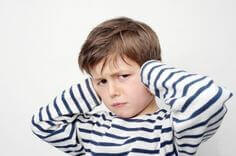Tips for Raising a Highly Sensitive Child

Why is my child highly sensitive? How can I raise a highly sensitive child to be successful in life? All children are special but perhaps when you discover that your child is highly sensitive, you felt overwhelmed and you asked yourself thousands of questions. But the truth is that your child is different from other children because they feel and live what happens around them in a much more intense way. By showing them how special they are to you, you’ll help them grow with confidence and maturity. Keep reading for more tips on raising a highly sensitive child.
The causes and symptoms of your highly sensitive child
But why is my child like that? You may wonder. The truth is, it can be genetic, passed from generation to generation. In a study by Dr. Elaine N. Aron, there were children with a nervous system that was very sensitive to everything. A highly sensitive child is overwhelmed by sudden changes, high levels of stimulation, and emotional distress from others.
In general, highly sensitive children behave conscientiously, preferring to think deeply about things before acting. From the time they’re babies, they react immediately to changes in light and temperature; They can also taste food and aromas from an early age but, for example, the fabric of clothing can cause a lot of discomfort and irritation to their skin.
They cry at the slightest thing, they’re bothered a lot by stimuli, they’re scared of unexpected sounds and other more complex things as they grow older.

If you want to find out if your child has the symptoms of a highly sensitive child, you can do a self-test, but the truth is that not all children experience the same symptoms. These will depend on the family, the environment where they live, the attention and care that they’ve been given, and mainly, their upbringing.
All these aspects make the child develop their own personality, even if they’re a highly sensitive child, that is, their senses (touch, sight, hearing, taste, and smell) have become very sensitive to the external world that surrounds them.
When it comes to raising a highly sensitive child in the best way possible, you must put yourself in their place. Who better than their parents to understand and accept that their child is highly sensitive.
What should you do?
First, find out everything you can about this diagnosis; This will help you a lot when it comes to explaining to others, whether they’re teachers, friends, or family, why your child behaves the way they do. You can seek the expert opinion of Psychologists such as Dr. Elaine N. Aron and Liliana Cassuso Ferrand, who are women who have studied this problem and written about it.
A highly sensitive child is in a process of unifying what they feel inside, that is, their way of perceiving the world, with their outside world, as they feel a hypersensitivity to things, emotionally and also physically. But what about raising a highly sensitive child to be successful in life?

Let’s start small, with 5 basic steps:
- Limits: You should not repress them, nor should you allow them everything they want. You must set rules and understand why you set them, that is, why it’s best for them.
- Technology: While this is a good tool for you to learn to communicate with others, it can also cause them to hide from the real world. So, it’s better not to spend so much time in front of the computer.
- Understanding: Your child isn’t a miniature adult. They don’t know how to control their emotions, and everything around them overwhelms them. Try to put yourself in their shoes.
- Calm and Tranquility: You already know why they react in a certain way, so getting mad at them won’t make things any better. Also, they don’t benefit from stress in the least.
- Interaction: You must encourage them to interact with the real world, and for that, you must be very creative in how you present things to them. For example, going to the park, seeing the stars from a telescope, having a pet, controlling their emotions, etc.
Highly sensitive children show more interest in people and situations around them, which is why it’s beneficial for you to help them have friends from a young age. This will make them outgoing children and give them more confidence when making decisions. Sometimes you just have to give them space and time to choose one of their options, things that may be trivial to you, but that are important to them and they have the right to choose. You shouldn’t decide for them or rush them.
Why is my child highly sensitive? How can I raise a highly sensitive child to be successful in life? All children are special but perhaps when you discover that your child is highly sensitive, you felt overwhelmed and you asked yourself thousands of questions. But the truth is that your child is different from other children because they feel and live what happens around them in a much more intense way. By showing them how special they are to you, you’ll help them grow with confidence and maturity. Keep reading for more tips on raising a highly sensitive child.
The causes and symptoms of your highly sensitive child
But why is my child like that? You may wonder. The truth is, it can be genetic, passed from generation to generation. In a study by Dr. Elaine N. Aron, there were children with a nervous system that was very sensitive to everything. A highly sensitive child is overwhelmed by sudden changes, high levels of stimulation, and emotional distress from others.
In general, highly sensitive children behave conscientiously, preferring to think deeply about things before acting. From the time they’re babies, they react immediately to changes in light and temperature; They can also taste food and aromas from an early age but, for example, the fabric of clothing can cause a lot of discomfort and irritation to their skin.
They cry at the slightest thing, they’re bothered a lot by stimuli, they’re scared of unexpected sounds and other more complex things as they grow older.

If you want to find out if your child has the symptoms of a highly sensitive child, you can do a self-test, but the truth is that not all children experience the same symptoms. These will depend on the family, the environment where they live, the attention and care that they’ve been given, and mainly, their upbringing.
All these aspects make the child develop their own personality, even if they’re a highly sensitive child, that is, their senses (touch, sight, hearing, taste, and smell) have become very sensitive to the external world that surrounds them.
When it comes to raising a highly sensitive child in the best way possible, you must put yourself in their place. Who better than their parents to understand and accept that their child is highly sensitive.
What should you do?
First, find out everything you can about this diagnosis; This will help you a lot when it comes to explaining to others, whether they’re teachers, friends, or family, why your child behaves the way they do. You can seek the expert opinion of Psychologists such as Dr. Elaine N. Aron and Liliana Cassuso Ferrand, who are women who have studied this problem and written about it.
A highly sensitive child is in a process of unifying what they feel inside, that is, their way of perceiving the world, with their outside world, as they feel a hypersensitivity to things, emotionally and also physically. But what about raising a highly sensitive child to be successful in life?

Let’s start small, with 5 basic steps:
- Limits: You should not repress them, nor should you allow them everything they want. You must set rules and understand why you set them, that is, why it’s best for them.
- Technology: While this is a good tool for you to learn to communicate with others, it can also cause them to hide from the real world. So, it’s better not to spend so much time in front of the computer.
- Understanding: Your child isn’t a miniature adult. They don’t know how to control their emotions, and everything around them overwhelms them. Try to put yourself in their shoes.
- Calm and Tranquility: You already know why they react in a certain way, so getting mad at them won’t make things any better. Also, they don’t benefit from stress in the least.
- Interaction: You must encourage them to interact with the real world, and for that, you must be very creative in how you present things to them. For example, going to the park, seeing the stars from a telescope, having a pet, controlling their emotions, etc.
Highly sensitive children show more interest in people and situations around them, which is why it’s beneficial for you to help them have friends from a young age. This will make them outgoing children and give them more confidence when making decisions. Sometimes you just have to give them space and time to choose one of their options, things that may be trivial to you, but that are important to them and they have the right to choose. You shouldn’t decide for them or rush them.
All cited sources were thoroughly reviewed by our team to ensure their quality, reliability, currency, and validity. The bibliography of this article was considered reliable and of academic or scientific accuracy.
- de Beijl, K. Z. (2016). Personas Altamente Sensibles: Descubre si lo eres y aprende a gestionar el día a día en tus relaciones, el trabajo, con tus hijos…. La Esfera de los Libros.
- Bujor, L., and Turliuc, M. N. (2014). “Personality, family correlates, and emotion regulation as wellbeing predictors”, Proc. Soc. Behav. Sci., 159: 142-146.
- Davis, M. H. (1980). “A multidimensional approach to individual differences in empathy”, JSAS Catalog Select. Doc. Psychol., 10: 85.
- Harke, S. Personas altamente sensibles. EDAF.
- Pluess, M., Assary, E., Lionetti, F., Lester, K. J., Krapohl, E., Aron, E. N., & Aron, A. (2018). Environmental sensitivity in children: Development of the Highly Sensitive Child Scale and identification of sensitivity groups. Developmental psychology, 54(1), 51. https://psycnet.apa.org/record/2017-42386-001
- Alehan, D., Celiker, A., & Özme, Ş. (1996). Head-up tilt test: a highly sensitive, specific test for children with unexplained syncope. Pediatric cardiology, 17(2), 86-90. https://link.springer.com/article/10.1007/BF02505089
This text is provided for informational purposes only and does not replace consultation with a professional. If in doubt, consult your specialist.








